Rose Of Sharon Seed Propagation: Harvesting And Growing Rose Of Sharon Seeds
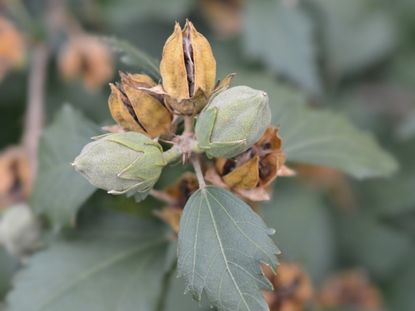
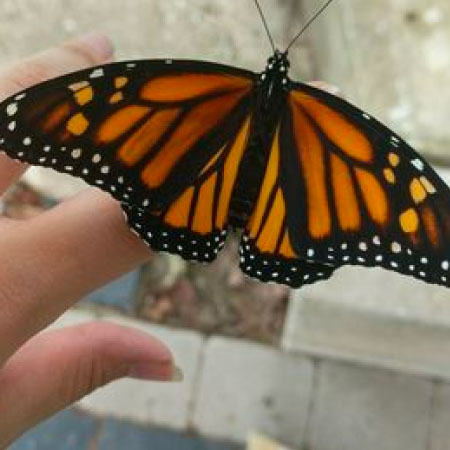
Rose of sharon is a large deciduous flowering shrub in the Mallow family and is hardy in zones 5-10. Because of its large, dense habit and its ability to seed itself, rose of sharon makes an excellent living wall or privacy hedge. When left untended, rose of sharon will drop its seeds close to the parent plant. In spring, these seeds will easily germinate and grow into new plants. Rose of sharon can quickly form colonies this way and are actually considered to be invasive in some areas. Knowing this, you may wonder, “Can I plant rose of Sharon seeds?” Yes, as long as the plant is not considered invasive where you are or, in the very least, will be grown in an area where it can be appropriately managed. Continue reading to learn how to harvest rose of sharon seeds for propagation.
Harvesting and Growing Rose of Sharon Seeds
In late summer and fall, rose of sharon is covered in large hibiscus-like flowers that are available in many colors – blues, purples, reds, pinks, and whites. These will eventually become seed pods for harvesting. Some specialty varieties of rose of Sharon, however, may actually be sterile and produce no seed to propagate. Also, when growing rose of sharon seeds, the plants you get may not be true to the variety you collected. If you have a specialty shrub and you want an exact replica of that variety, propagation by cuttings will be your best option. Flowers of rose of sharon begin to develop into seed pods in October. These green seed pods then take six to fourteen weeks to mature and ripen. Rose of sharon seeds grow in pods with five lobes, with three to five seeds forming in each lobe. The seed pods will become brown and dry when they are ripe, then each lobe will split open and disperse the seeds. These seeds do not go far from the parent plant. If left on the plant through winter, rose of sharon seeds will provide food for birds like goldfinches, wrens, cardinals, and tufted titmice. If conditions are right, the remaining seed will drop and become seedlings in the spring. Collecting rose of sharon seed is not always easy because its seeds ripen in winter. The seeds need this cold period to properly germinate in the spring. Rose of sharon seeds can be collected before they ripen, but they should be allowed to dry out, then placed in a paper bag in the refrigerator until you are ready to plant them. If rose of sharon seed pods are harvested too early, they may not ripen or produce viable seed. A simple method of rose of sharon seed collection is to put nylon or paper bags over maturing seed pods in late autumn or early winter. When the pods pop open, seeds will be caught in the nylon or bags. You can still leave half for songbirds.
Rose of Sharon Seed Propagation
Learning how to grow rose of sharon seeds is easy. Rose of sharon grows best in humus rich, fertile soil. Sow rose of sharon seeds ¼-½ (0.5-1.25 cm.) deep. Cover loosely with appropriate soil. Plant seed outdoors in autumn or indoors 12 weeks before last frost date for your area. Rose of sharon seedlings need full sun and deep waterings to develop into tough plants. They may also need protection from birds and animals when they are young.
Gardening tips, videos, info and more delivered right to your inbox!
Sign up for the Gardening Know How newsletter today and receive a free download of our most popular eBook "How to Grow Delicious Tomatoes."
-
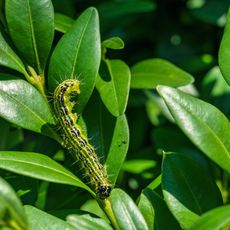 Shrub Diseases And Pests To Watch Out For
Shrub Diseases And Pests To Watch Out ForShrub diseases and pests can be challenging. Learn how to recognize and eradicate them before they can present a danger to your plants.
By Susan Albert
-
 Foodscaping: The Most Beautiful Way To Grow Your Own Food
Foodscaping: The Most Beautiful Way To Grow Your Own FoodFoodscaping is a beautiful and profoundly practical way to mix beauty and function in your yard. Try food landscaping for a real sense of abundance.
By Bonnie L. Grant
-
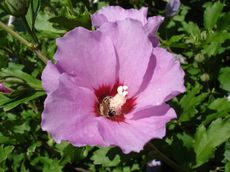 Rose Of Sharon Problems - Dealing With Common Althea Plant Issues
Rose Of Sharon Problems - Dealing With Common Althea Plant IssuesRose of sharon, or althea shrubs as they are commonly called, are usually low maintenance, reliable bloomers in zones 5-8. However, like any other landscape plants, rose of sharon can experience problems with specific pests or diseases. Learn more here.
By Darcy Larum
-
 Rose Of Sharon Fertilizer Guide: Learn How To Feed An Althea Plant
Rose Of Sharon Fertilizer Guide: Learn How To Feed An Althea PlantSometimes, as gardeners, the things we do to try to help our plants can actually harm them. For example, rose of sharon shrubs can be very sensitive to over-fertilizing. Learn how to fertilize an althea shrub correctly in this article.
By Darcy Larum
-
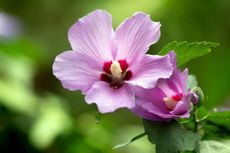 My Rose Of Sharon Is Not Blooming – Reasons For No Rose Of Sharon Flowers
My Rose Of Sharon Is Not Blooming – Reasons For No Rose Of Sharon FlowersA rose of sharon without blossoms is just a nice shrub. If you aren?t seeing any flowers on your rose of sharon, there is likely a simple problem that can be solved, although it may not be until next year that it blooms again. Learn more in this article.
By Mary Ellen Ellis
-
 Rose Of Sharon Winter Care: Preparing Rose Of Sharon For Winter
Rose Of Sharon Winter Care: Preparing Rose Of Sharon For WinterRose of sharon is usually planted in the ground but it can also be grown in containers as a lovely patio plant. Whether in containers or the ground, winter care for rose of sharon may be required. Learn more about overwintering rose of sharon here.
By Darcy Larum
-
 Is Rose Of Sharon Invasive – How To Control Rose Of Sharon Plants
Is Rose Of Sharon Invasive – How To Control Rose Of Sharon PlantsWhen you want to learn how to control rose of Sharon, remember that prevention is always easier than cure. Click here for tips on limiting rose of Sharon growth rate and what to do if your rose of Sharon is out of control.
By Teo Spengler
-
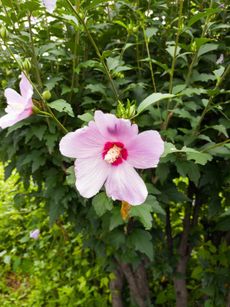 Moving Rose Of Sharon – How To Transplant Rose Of Sharon Shrubs
Moving Rose Of Sharon – How To Transplant Rose Of Sharon ShrubsWith a stiff, upright habit and open branches, rose of Sharon works in both informal and formal garden arrangements. Transplanting a rose of Sharon shrub is not difficult. Click this article for tips on how and when to transplant this shrub.
By Teo Spengler
-
 Rose Of Sharon Companion Plants: What To Plant Near To Rose Of Sharon
Rose Of Sharon Companion Plants: What To Plant Near To Rose Of SharonBecause rose of Sharon is rather uninteresting for much of the season, selecting plants that grow well with it can help. This article provides a few great rose of Sharon companion planting ideas. Click here for more information.
By Mary H. Dyer
-
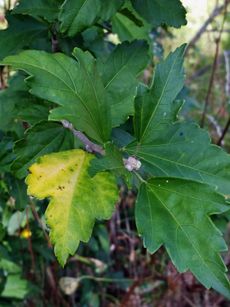 Yellowing Rose Of Sharon Leaves – Why Rose Of Sharon Has Yellow Leaves
Yellowing Rose Of Sharon Leaves – Why Rose Of Sharon Has Yellow LeavesIf you notice your rose of Sharon has yellow leaves, you're understandably perplexed about what has befallen this trusty, late summer bloomer. Click this article to learn a few of the most common reasons for rose of Sharon leaves turning yellow.
By Mary H. Dyer